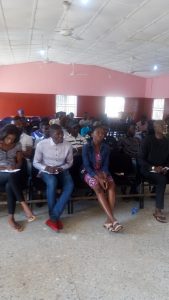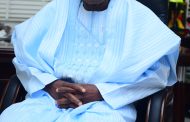The African continent is not underdeveloped because Africans are stupid. Africa is materially backward relative to other civilisations because it finds itself fighting for survival on two equally deadly fronts, Professor Georges Nzongola-Ntalaja, US based Professor of African and African-American Studies has said.

Pof Nzongola speaking yesterday at the University of Abuja
The first deadly front, according to Prof Nzongola-Ntalaja, is how Africa was stopped by the international system and lost out in the Cold War. Unlike the Asians who benefitted from billions of dollars for South Korea, for example, because of American interests there, Africa was stopped from reaping the benefits of industrialisation as an example. As a result, African countries which were developmentally at the same level with some counterparts in Asia backslided. He gave the example of Ghana and South Korea in the 1960s or Belgian Congo which, by 1959, had the same level of industrial production as Canada, with 10% of its GDP being of industrial origin, with the Congo having chemical and shipbuilding industries aside from soft industries like breweries. The speaker summed up the contradiction in the narrow class interests of African nationalist leaders, who chose to accept dependent mini-states instead of the larger units that came out of some of the colonial empires.
“It is not that we Africans are more stupid than others. A lot has to do with the international system, the international political economy”, he said in response to questions by students of Political Science at the University of Abuja Tuesday. Compared to the Asians, Africa lost out and came out of the Cold War as the losers, the professor argued, acknowledging though that unlike African leaders and policy makers, Asian policy makers and leaders do not swallow IMF/World Bank pills without questions.
Professor Nzongola who has been involved multilateral interventionism said some of the proposals that African countries had accepted left him wondering, a point which connected to the second deadly front his facts spoke to. Thematised under ‘Challenges of Democratic Governance’ on which he spoke, the professor said Africa has no chance of moving forward from where it is unless and until it addressed three crucial points. He listed these as observance of rule of law, resolving the problem of citizenship away from indigeneity and drastically improving the livelihood of majority of the people.
The landscape of authoritarian leaders which undermine the rule of law is not good for the continent, argued Prof Nzongola who took time to go through the perfect case studies in unproductive longevity in power across Africa and the arbitrariness that characterise the process. Although attributing to these factors the paradoxes of Africa – hunger on a continent which has more food than any other or darkness in the continent which is more blessed than any other in terms of energy resources, Nzongola dresses down the claim of African democracy, saying it no longer makes sense. Aligning himself with the argument of Nobelist Amartya Sen as articulated in the 2003 article titled “Democracy and Its Global Roots”, he said democracy as a concept does not belong to anybody but exists as a universal value, notwithstanding local variations. What is required for democracy to make progress in Africa is strong institutions as well as men and women of dedication and courage, he further submitted, citing Professor Attahiru Jega’s innovations in election management as an example of what he had in mind.

President Paul Kagame of Rwanda, a guerrilla turned developmental statist?
On the contentious issue of African exceptionalism in the capacity to slaughter each other as happened in Rwanda, as is happening in South Sudan and are still happening in many other African countries, Professor Nzongola conceded the blame game should be over now but did not categorically take a stand on whether Africa is cursed or not. He, however, isolated President Paul Kagame of Rwanda for commendation for developing Rwanda to what it is today. Although chastising Kagame for plundering the DRC to develop Rwanda, (facts out already in reports of the UN Security Council’s Group of Experts on the Illegal Exploitation of the Natural Resources of the DRC and Other Forms of Wealth), Professor Nzongola nevertheless said “I have some respect for Kagame. It is a minority and dictatorial regime. But Kigali looks like a European city”, he told his audience, emphasizing the level of development is such that every lad has a laptop.
Professor Nzongola is sure that the late John Garang might have been the other exception if he had lived, describing him as genuine and free of ostentatious life, adding “we don’t know what killed him”. John Garang, he said, spoke Arabic fluently and when he was in motion, it gave the incumbent Sudanese president creeps. In other words, John Garang was not likely to be among African leaders who stole the people blind and stashed the loot away or bought property in the West which their managers converted to their own as soon as such African leaders died or fell out of power.

Students at the occasion
Professor Nzongola joins the list of distinguished scholars of African Studies who have addressed the University of Abuja student audience before, among them the late Prof Ali Mazrui, Prof Paul Lubeck of John Hopkins University in the US, the late Tajudeen Abdulraheem of the United Nations and Prof Peter Anyang Nyong’o, the Kenyan Political Scientist. Present at the occasion were senior academics of the Department, led by the HOD, Prof Yusuf Zoaka. Contrary to the impression that university students nowadays are barely interested in knowledge because the Nigerian society itself has problem of self-understanding, Intervention observed a very enthusiastic studentry eager to ask uncomplicated questions but which bore the stamp of their own bewilderment and concern for their own future as well as Africa’s.
Professor Nzongola-Ntalaja is no stranger to Nigeria at all, having taught Political Science at the University of Maiduguri in the 1970s, Today, the citizen of the Democratic Republic of Congo, (DRC) is back in the United States at the University of North Carolina at Chapel Hill. He had been in Nigeria in the year 2000 as UNDP Senior Adviser on Governance to the Federal Government of Nigeria. This week, he was back in Nigeria for a multiplicity of engagements.
Professor Nzongola is noted by Professor Okello Oculi, his ‘junior’ at the University of Wisconsin as one of the few students who took the risk of deploying Marxist analysis and got away with it. According to Oculi, a Lagos chap with the surname Coker who was passionate about Nkrumah and such radical consciousness was not that lucky. He was encouraged to leave the university’s International Studies programme and find another school.




























